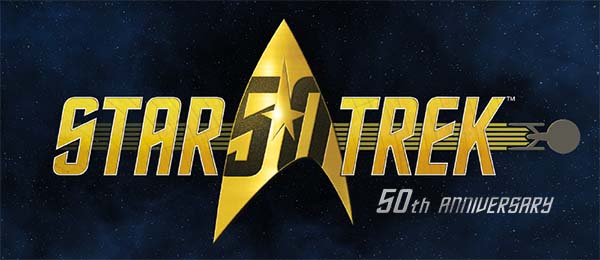
On September 8, 1966, a cultural revolution started. The first episode of a new science fiction television series named Star Trek premiered on NBC. This series broke new ground in the genre of science fiction by being one of the first series ever to present high science fiction concepts to television audiences, while also using its space adventures as allegories for contemporary social and political issues. While it presented itself as mindless space adventure in the same vein as Buck Rogers and Flash Gordon, it took a serious approach to science fiction that (at the time) was limited to literature like the novels of H.G. Wells and the stories of Isaac Asimov.
Star Trek wasn't the first serious science fiction television series. Shows like The Twilight Zone and The Outer Limits had existed for a almost a decade. But Star Trek differed from these series in that it depicted a revolutionarily positive and uplifting version of the future of humanity during the height of the paranoia of the Cold War. Humanity, according to Star Trek would overcome the threat of mutual destruction that the Cold War between the United States and the Soviet Union posed, and we would come out the other side with a spirit of cooperation and a desire to peacefully and benevolently explore the stars, exploring strange new worlds and seeking out new life and new civilizations.
Television science fiction was dominated by childish adventures like Buck Rogers
and more cynical anthology series like The Twilight Zone that drew off of Cold War paranoia.
The show was created by Gene Roddenberry, a former United States army air force pilot and Los Angeles police officer who eventually found his calling as a television writer and producer. He wrote and produced some police dramas and westerns before pitching his defining project: Star Trek. The show was picked up by Desilu Productions, a company that was run by Lucille Ball (yes, the titular actress of I Love Lucy) and her husband. The production of Star Trek was tumultuous. The show was canceled by NBC after its second season, only to be revived due to an unprecedented, fervent letter-writing campaign staged by its fans. It did not survive its third season, however, as Desilu Productions was rapidly running out of money, was forced to cut budgets, and NBC moved the show to the dreaded Friday night "death" slot. In an age before DVRs, or even VCRs, if people were out on the town on a Friday night, and they missed an episode of a show, then that episode simply went unseen.
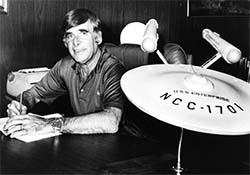
Gene Roddenberry's optimistic vision
of the future remains endearing.
The series eventually saw tremendous success after its cancellation due to its episodes being syndicated during the 1970's. It gained a cult following that grew and grew, setting up conventions that would come to draw thousands of attendees. Though not immediately apparent, Star Trek would grow to become one of (if not the) most successful science fiction properties in the world. The series is often cited by scientists, engineers, and astronauts as their inspirations for their careers, and the technology of the series has inspired many real-world technological innovations, such as wireless communication, mobile devices (in particularly mobile phones), speech-recognition software, and so on. Roddenberry became the first TV writer to receive a star on the Hollywood walk of fame, has been inducted into the Science Fiction Hall of Fame and the Academy of Television Arts & Sciences Hall of Fame, and was one of the first human beings ever to have his ashes carried into earth orbit.
Decades later, I still grew up with Star Trek
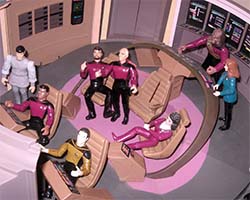
I grew up with Playmates' awesome
line of Star Trek toy figures and ships.
Despite not being born until decades after the original series was canceled, I still grew up with Star Trek. My dad watched the show, and he passed an interest in science fiction (and science in general) down to me. He would often buy cassette tapes of original series and Next Generation episodes for me when I was young, and some of my earliest memories involve watching Star Trek episodes and movies and playing with Star Trek toys. Playmates manufacture a long-standing line of awesome Star Trek action figures and star ship toys, and many of those beloved toys still rest in storage bins in my parents' garage. One of my earliest theater-going memories is going with my dad to see Star Trek VI: the Undiscovered Country in theaters. That movie, of course, was a bit too cerebral for my six-year old mind, but after viewing it during my college years, I came to appreciate it much more. It has since become my favorite movie in the franchise, and might be one of my favorite movies, period.
I grew up in Las Vegas, which is a very transitory town. I had trouble making and keeping friends, in part because families kept moving in and out of houses in our neighborhood, but also because being a "nerd" was still highly stigmatized back then. It was hard to find people who shared my interests. Star Trek, Star Wars, video games, and comic books weren't as universally accepted as they are now. So characters such as Kirk and Spock weren't just television characters to me, they were also friends - friends that stayed and didn't move away.
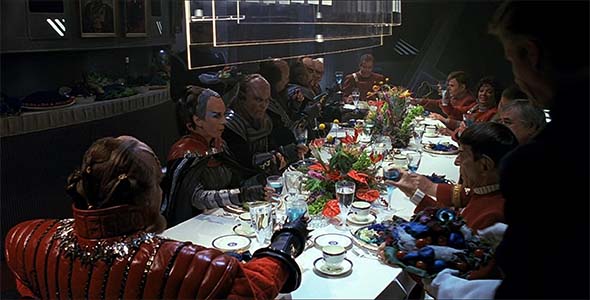
Though I was too young to understand and appreciate it at the time, seeing
The Undiscovered Country with my dad is one of my earliest theater-going memories.
Star Trek also informed my personality and morality. I grew up accepting concepts such as diversity, post-scarcity economics, and respect for other cultures. I grew up understanding that problems could be solved through reason and negotiation rather than through violence. And I grew up believing that a firm understanding of the universe around us is critical to improving our lives and solving our worldly problems. And I grew up believing that everybody could have something useful to contribute, regardless of where they came from, what they believed, what color their skin was, or whether they have weird ridges on their forehead. Star Trek made me a humanist long before I knew what a "humanist" is.
Ironically my favorite episode was probably always "Balance of Terror", in which a Romulan Bird of Prey crosses the neutral zone and uses its newly-developed cloaking device to conduct sneak attacks on Federation outposts. Instead of the optimistic vision of the future that the show was famous for, this episode played on the exact same Cold War paranoia that was prominently featured in The Twilight Zone. Despite exploiting a Cold War allegory, this episode also managed to subvert some of the paranoia that the Cold War created. It told a story of a crew member who overcomes his suspicious of Mr. Spock due to his resemblance (and supposed affiliation) to the enemy. It warned against the paranoid McCarthy witch hunts of the decade before. Of course, I didn't come to appreciate the meaning behind this episode until I was much older. As a child, I just liked the Bird of Prey and its terrifying cloaking device and weapons.
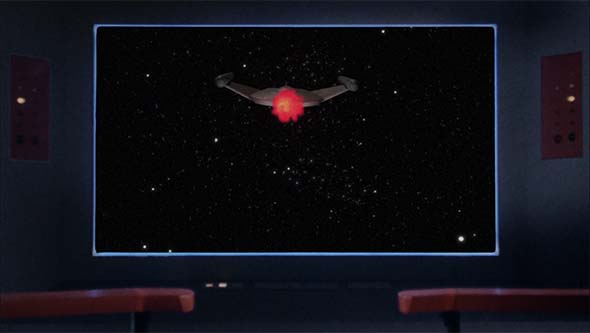
"Balance of Terror" both exploited and subverted McCarthy-era Cold War paranoia.
My favorite episodes are from The Next Generation
As much as I adore the original series' cast and characters, and as much as I adore the design of the films' version of the Enterprise, I have to say that my favorite episodes are all The Next Generation episodes. This series contains almost all of my favorite individual episodes of the franchise, as well as my personal favorite character, the android Lieutenant Commander Data. The show doesn't get off to a good start though. The first two season are very shaky, with silly costumes, cheesy special effects, and questionable story choices and character developments. Following the second season, Gene Roddenberry stepped down as producer for health reasons (and possibly due to lack of quality in the first two seasons), and Michael Piller and Rick Berman took the reigns of the show. As much as I appreciate Gene's vision of a future of peace on Earth and benevolent exploration of the cosmos, Roddenberry stepping down might have been the best move that the series (and franchise) could have made.
The first two seasons of TNG are very rough and sloppy, and production quality soared going into season 3.
The turning point for the series, for me, comes midway into season two with the episode "The Measure of a Man". In this episode, Starfleet research engineer Maddox arrives on the Enterprise with the intent of disassembling the android officer Data in order to study (and hopefully replicate) his positronic brain. Data protests out of fear that the disassembly process would irrevocably damage himself or his memories, but Maddox argues that Data is "property" of Starfleet, and that his refusal to undergo the procedure is comparable to the Enterprise's computer refusing to undergo a refit. Picard takes the case to the local judge advocate general and a trial involving Data's legal status and citienship ensues. This episode stands out to me as the first truly great episode of Next Gen. There were some other "OK" episodes in the first two seasons, but "The Measure of a Man" is the first episode (and only episode of the first two seasons) that I really consider to be a must-watch. The closest runner-up would maybe be "Q, Who", but only because it is the establishing episode for the Borg.
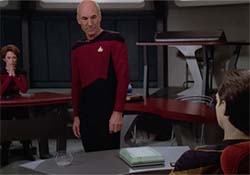
For me, "The Measure of a Man"
marks the turning point for the series.
Season three is sort of a soft reboot for the series, with marked improvements in production quality, costumes, set design, special effects, and script-writing. Season three is where Next Gen really started to hit its stride and deliver episode after episode of quality television. Stand-out episodes include "Who Watches the Watchers", "The Enemy", "The Defector", "Deja Q", "Yesterday's Enterprise", "The Offspring", and the season-three cliffhanger finale, "The Best of Both Worlds". It was season three in which the actors really start to seem comfortable in the skin of their characters (possibly due to the much-improved costume designs), and the scripts become tighter and better focused.
The series would continue to deliver some truly exceptional episodes throughout the rest of its run, and would often include some minor season-long narrative arcs that would be picked up in multiple episodes of a season. This would set a precedent for the format of future series in the franchise, and for television narrative in general. But it would continue to be the single episodes that stand out the most. Episodes like "Darkmok", "The Inner Light", "I, Borg", and "Chain of Command" highlight the rest of the series' run. But while Next Generation has most of my favorite stand-alone episodes of Star Trek, I think my favorite series overall is the follow-up series: Deep Space Nine.
The rest of the universe comes to Deep Space Nine
The original series and Next Generation featured a starship-bound crew exploring the galaxy. Each episode, thus, tended to be self-contained, and storylines had to be fully [mostly] resolved within the 40-something minute runtime of an episode because the ship would be moving onto a new world with a new story for the next episode. That changed in Deep Space Nine, which featured a crew stationed on a space station in a strategically-critical crossroads of the frontier. Instead of seeking out new life and new civilizations, those new lifeforms were now coming to our setting. This stationary nature opened the show up to new narrative formats that allowed it address more complicated, nuanced issues and stories, and those storylines could persist over a longer period of time.
DS9 routinely tackled taboo topics in greater depth than the previous series.
Deep Space Nine prominently featured topics and situations that the original series and Next Gen could only touch on, if they ever bothered to deal with them at all. Religion, politics, war, terrorism, espionage, and economics all became frequent themes of storylines that often persisted over the course of multiple episodes or seasons. Topics that are widely considered taboo at dinner tables became staples of Deep Space Nine's narrative. There were episodes that paralleled issues ranging from the teaching of creationism in public schools, to the unionization of workers, to the regulation of business in a free market economy, to racism and civil rights, to same-sex relationships, to religiously-motivated terrorism (long before Al Qaeda, Osama Bin Laden, or ISIS were household names). Heck, one of the foundational pillars of the series is a Holocaust allegory!
With all the various aliens coming and going in the space station, Deep Space Nine might represent the best and fullest realization of Roddenberry's embrace of diversity. The show allowed us to spend more time with characters of different species, cultures, and ideologies, and those alien cultures received much greater depth because of it. We had the devoutly-religious Bajorans, the hyper-capitalistic Ferengi, the lifetime-spanning Trill, and the paranoid Cardassians. All these various characters from all these differing cultures, with all their differing (and often-times opposed) ideologies had to interact and work together to solve common problems.
Best of all, the more serialized nature of the series allowed it to establish a rich, dynamic, and lovable ensemble of recurring guest characters. Characters like Ferengi liquidator Brunt and the Grand Nagus provided frequent comic relief with their caricatures of conservative capitalists. Jeffrey Combs protrayed Brunt, but he also portrayed other guest characters including the charmingly-conniving Dominion villain Weyoun. Combs' was always a highlight of the screen, and he frequently stole the show whenever he was present. As the war with the Dominion kicked up, we also saw recurring characters like the noble Klingon General Mortok, and Starfleet admirals such as William Ross. We got to see aspects of the darker side of the Federation with recurring appearances from the mysterious Section 31 agent Sloan. There were also quirky characters like the recurring holodeck entertainer Vic Fontaine (with his tribute to legendary Las Vegas singer Frank Sinatra). Then there's the dispicably-manipulative Kai Winn and her bands of Bajoran clerics. But the highlight of the guest cast was perhaps the most dynamic and Shakespearean of all Trek villains: Gul Dukat. His arc is an unpredictable roller coaster ride of highs and lows. We hate him at the start, only to have him almost reach redemption and become a tragic and sympathetic hero, before finally being pushed completely off the deep end to near-comic-book levels of villainy. Dukat is a microcosm of what makes DS9 so great: the fuzzy grayness of its moral and ethical lines, and the depth to which the show will explore those lines.
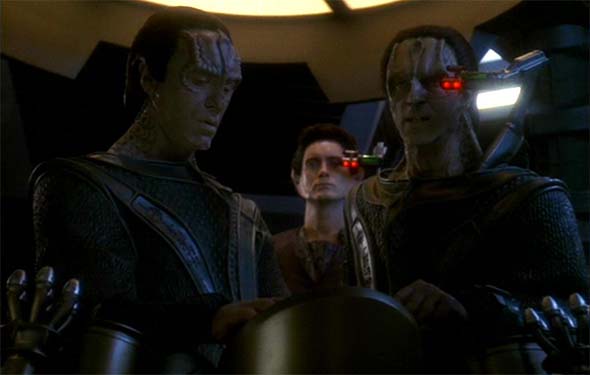
By the end of its run, Deep Space Nine had established a rich, dynamic, and outstanding ensemble guest cast,
including perhaps the most dynamic and interesting villain in the entire franchise: Gul Dukat.
It took me a long time to come to appreciate Deep Space Nine. It first ran on television during my pre-teen and early teen years, and its time slot on Sunday evenings on Fox meant that I missed many first-run episodes because I was out playing tag football and street basketball with neighborhood friends. So on the rare occasion that I would catch an episode, I rarely (if ever) really understood what was going on because I often missed the episodes that built up to the storyline I was watching. Needless to say, I didn't really care for the show much when it was originally on TV, and TNG remained my favorite series by a long-shot. So when the series released on DVD and I was able to watch it from start to finish, I was amazed at just how much I'd missed. It also helped that I was older and better able to understand and appreciate the depth of the stories being told.
This serialized nature also made Deep Space Nine ahead of its time in many ways. At the time, weekly television series still told very compartmentalized, self-contained stories in each episode, and every new episode hit a "reset" switch so that the story of one episode was rarely (if ever) dependent on previous episodes. This was mostly the result of networks wanting to make shows that they could sell to syndication so that they could continue to see royalty revenue from re-runs. The idea of season-long story arcs and each episode being a single "chapter" in a continuous story would become standard in cable and network television story-telling in the 2000's and 2010's with hit shows like How I Met Your Mother, Battlestar Galactica, Game of Thrones, The Walking Dead, and American Horror Story. It also looks like this sort of serialized format will also be the foundation for the new Star Trek series: Star Trek: Discovery.
Voyager puts the series in decline
Next Generation and Deep Space Nine represent, to me, the indisputable peak of Star Trek as a franchise. The next series, Voyager, misses much of its potential. In concept, there's a lot for this show to work with: two crews with radically different ideologies, lost on the opposite end of the galaxy with limited resources, must work together to return home. There's fuel there for lots of drama in the form of inter-personal conflict and a group of characters becoming increasingly desperate and willing to push their morality and ethics to their breaking point. Voyager never really cashes in this potential. It drops most of its more original concepts within a season or two of premiering, and was just too clean and too cheerful. Almost a decade later, the Sci-Fi network's Battlestar Galactica more fully realized the potential that Voyager promised, but never delivered. Voyager was too much Gilligan's Island, and not enough Battelstar Galactica.
Battlestar Galactica's depiction of a ship and crew always on the verge of
falling apart at the seams is what Voyager should have been.
But that doesn't mean that Voyager is without merit. It still has it's high points. Episodes like "Deadlock", "Tuvix", "Real Life", "Distant Origin", "Mortal Coil", "Living Witness", and "Critical Care" are all stand-out episodes that definitely deserve watching.
Perhaps Voyager's greatest strength, and also one of its biggest weaknesses is the presence of the Borg. Jeri Ryan brilliantly performs the role of a former Borg drone liberated from the collective and given back her own life. Her character, her exploration of her new-found humanity, and her interactions with the holographic Doctor are easily the highlights of the series. The series, however, does become a bit over-focused on Seven of Nine, the Doctor, and the Borg. Seven's "expertise" with the Borg leads Captain Janeway and Voyager to actively seek out the Borg and antagonize them in order to manipulate them into getting technologies that they want. I've already written about how this series finishes a process of humanizing the Borg that began in Star Trek: First Contact. It completely takes away the qualities that make the Borg intimidating, and it completely destroys the Borg as a compelling character and villain.
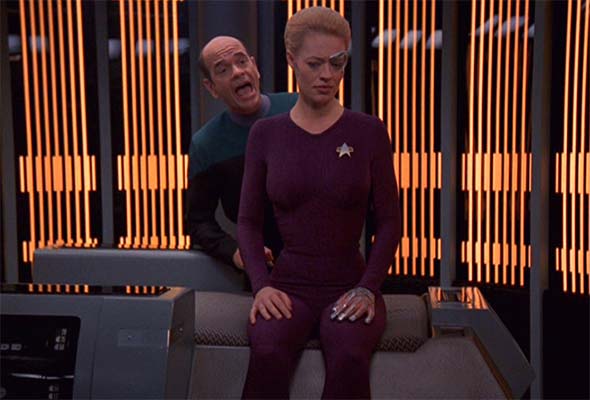
Jeri Ryan's performance as former Borg drone Seven of Nine rediscovering her humanity is the highlight of the series.
Prequel disappointment
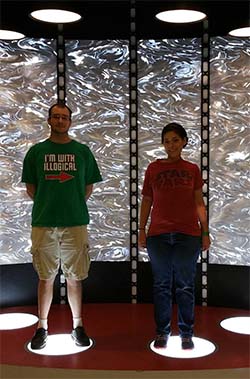
My girlfriend and I at a 2015
Star Trek Convention in Las Vegas.
The downward trend continued with Enterprise, a show so confused by its own identity that it was too ashamed to put "Star Trek" in its title, but also couldn't resist needless (and often failed) fan-service. The show never really clicked for me, but I've also never really given it a real second chance the way that I did with Deep Space Nine. Maybe I will someday, and maybe my opinion of it will soften over time. I've already written more detailed opinions on this show, and I invite you to read them.
This series isn't very memorable to me. It did, however, serve as a significant conversation piece between me and my first high school crush. I started talking to her after noticing a photo of Spock on her binder. I asked her about it, and we talked about our shared love of the series. We often talked about the newest episodes of Enterprise before class (and sometimes during class), as well as what we liked about the show and (more often) what we disliked about the show. Sadly, I never worked up the courage to ask her out on a date, or to confess my attraction to her, and that has been one of my biggest lifetime regrets. Fortunately, though, I did eventually find love years later, and my current girlfriend and I often share our fondness of Star Trek with each other.
Practical work experience
Even with Star Trek off the air after the cancellation of Enterprise, the show lived on for fans, and for me. In fact, it lived on quite literally, as I got a job at Star Trek: the Experience at the Las Vegas Hilton. I worked there for about two years until the company that owned the attraction shut it down due to an inability to work out a deal with the host hotel to renew the heavily-discounted lease it had given ten years prior. That job was probably the best job that I've ever had, and could very well be the best job that I will ever have.
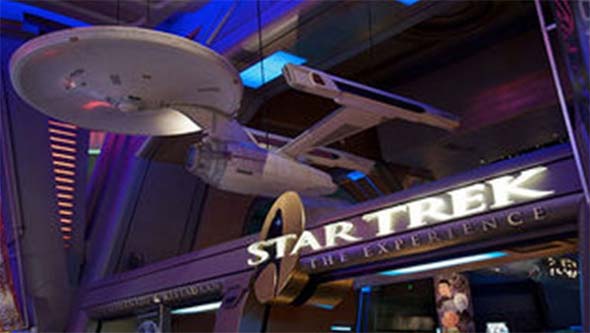
I worked at Star Trek the Experience in Las Vegas for two years. Many of my former co-workers are now close friends.
I wasn't lucky enough to get to perform as an actor in alien makeup; instead, I worked as a simple retail associate in the gift shop. However, I did spend a great deal of time working as a photographer (sort of), and was tasked with escorting guests up to the Enterprise bridge set in order to take novelty photographs of them sitting in the captain's chair. Yep, I literally had a job in which I worked on the bridge of the Enterprise! What more could a Trek-fan ask for? Most of my close friends were made while working at that job. We still often get together for board game groups, to play Dungeons & Dragons campaigns, and other shenanigans. They're good people, and I love them dearly.
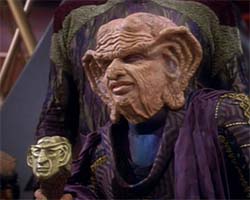
Wallace Shawn once used a trading
card of Grand Nagus Zek as photo ID.
Once, during a convention, Wallace Shawn came to my register to buy some gifts. He paid with a credit card, which required (as per company policy) providing photo identification. Mr. Shawn handed me a trading card of Grand Nagus Zek. I think it was the trading card that came with the Grand Nagus Zek Playmates action figure. I showed the card to my manager on duty - who was standing right beside me - and asked if this was acceptable photo ID. He nodded "sure", but Mr. Shawn, with his trademark grin, handed me a passport regardless.
That job also helped me to land both of my next two jobs as a software engineer. In both cases, I included "Star Trek the Experience" on my resume, and it caught the attention of the individuals in charge of hiring. In the first case, the hiring individual's wife was a Star Trek fan and insisted that he interview me. In the second case, the hiring director himself was an original series buff. At the conclusion of the interview, after having finished asking me about my programming experience and testing my knowledge, he threw a curve-ball question at me: "Who is Richard Daystrom?" At first, I thought I misheard the question, or that the director had miss-spoke. I assumed this was still a software development question. Did he mean Edsger Dijkstra? After watching the gears turn in my head for a few moments, he clarified "the inventor of the M-5 computer?", at which point, there was no doubt anymore. I answered, "and inventor of the duotronic computer and founder of the Daystrom Institute.". From there, the interview was mostly just a geek conversation with him and the other members of his team, and I had already gotten the job. I think I'll continue putting "Star Trek the Experience" on my resume, no matter how long ago it was or what new job I'm applying for!
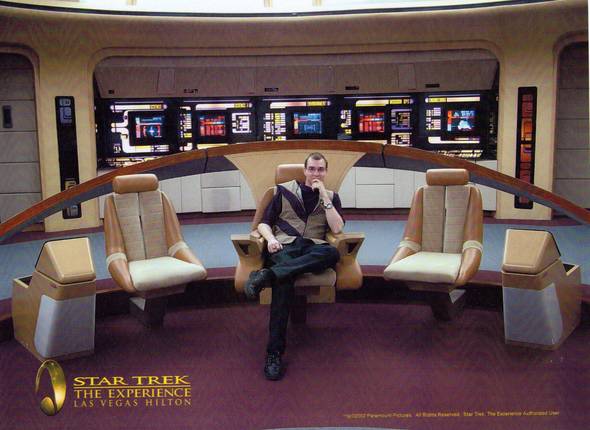
First day at work. You're so jealous right now, aren't you?
My hopes for the series
I'm skeptical about the future of the franchise. On the one hand, I fear that the universe may be too bloated to be able to support any future iterations without the severe risk of collapsing in on itself - a process that may have already started with Enterprise. It could be that J.J. Abrams was on the right track with the idea of rebooting the series, but it's very unfortunate that he chose to turn it into an action movie set in space rather than trying to approach it as genuine, thoughtful science fiction. Star Trek: Beyond took some decent steps forward with its treatment of the characters, but it still couldn't find a way to work in a more cerebral plot or villain.
As for the newly-announced Star Trek: Discovery series: I am cautiously optimistic. Early rumors suggested that the show may be a seasonal anthology series, and I've long been pitching the idea of a Star Trek anthology series to my friends and colleagues. Unfortunately, none of those friends or colleagues work at CBS or Paramount, so those ideas had mostly fallen on deaf ears. I hope that I'm not the only one who thinks the series extensive universe is rife for an anthology series, and I hope that the new show goes in that direction. An anthology promises the idea of being able to explore areas and aspects of the series canon that we've never seen before or which have never been fully developed. We don't have to be confined to a single crew on a single ship, nor must we be confined to presenting the series from the point of view of humans or Starfleet. The options are boundless. But we'll have to wait to see what the future holds.
I remain skeptical - but hopeful - of the future of the francise.
Regardless, Star Trek has been a foundational element of my identity. I've loved it for as long as I can remember, and I expect that I will continue to love it until I die. I can be critical of it, and there's certainly elements of the franchise that I've made no hesitations about expressing my distaste for. But the ideals of the series, the sense of awe and wonder regarding exploration and discovery, and the series' revolutionary optimism and humanism will always be with me.
Star Trek, I have been, and always shall be, your fan.